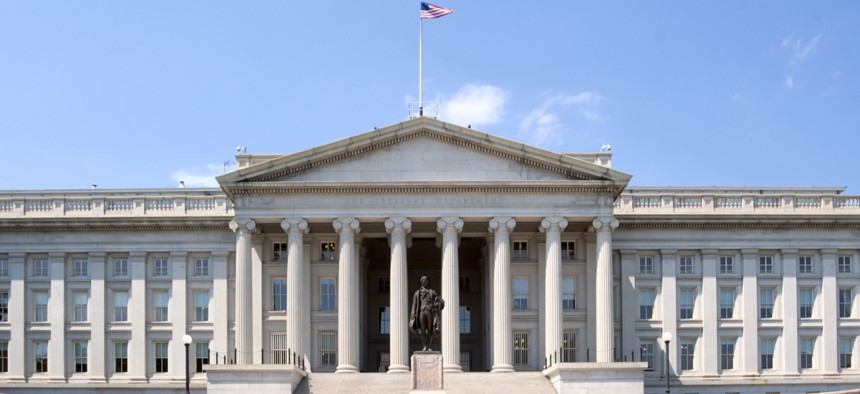Treasury Department Wants To Move Its Cloud Into Another Cloud

Natalia Pushchina/Shutterstock
The Fiscal Service wants to move its servers into two third-party managed data centers while keeping ownership and control over its hardware.
The Fiscal Service—the Treasury Department component charged with compiling and ensuring public access to the government’s financial accounting—wants to move its cloud servers into a third-party’s cloud infrastructure.
The service issued a request for information Thursday seeking feedback on vendor offerings for colocation services.
Colocation is a form of cloud service in which an organization moves its hardware—servers, racks, etc.—to a third-party data center. The organization—in this case the Treasury Department—maintains ownership of its hardware while contracting with the vendor for other physical Infrastructure-as-a-Service.
Within the Fiscal Service, the Office of Information and Security Services “has a need to place network equipment within two hosted colocation data centers,” one on each coast, according to the RFI. “This placement will allow for low-latency network availability to several hosted cloud services,” and multiple cloud service providers.
Per the RFI, those services should include 24x7x365 on-site technical support and security, biometric hand readers, closed-circuit cameras, access control lists and motion detectors. The agency needs “space for up to 12 server racks within a private caged area,” only accessible with a Fiscal Service-issued personal identity verification card. The service wants to be able to add its own video surveillance system, as well.
The vendor must offer two 10G connections for in-house cloud exchange providers. The RFI specifically states that cloud exchange services cannot be provided by a third-party.
“The on-site cloud exchange provider shall have a minimum of 40 onsite cloud provider onramps at the colocation data center campus,” with access to, at a minimum, Amazon Web Services Direct Connect, Microsoft Azure Government ExpressRoute, Google Cloud Services, Verizon Communications SD Interconnect and ServiceNow.
The vendor must also provide two 10G dedicated connections between data centers on each coast.
A technical document posted with the RFI includes more detailed requirements.
Responses to the RFI are due by 4 p.m. August 24.
NEXT STORY: Staying ahead of threats on government networks






